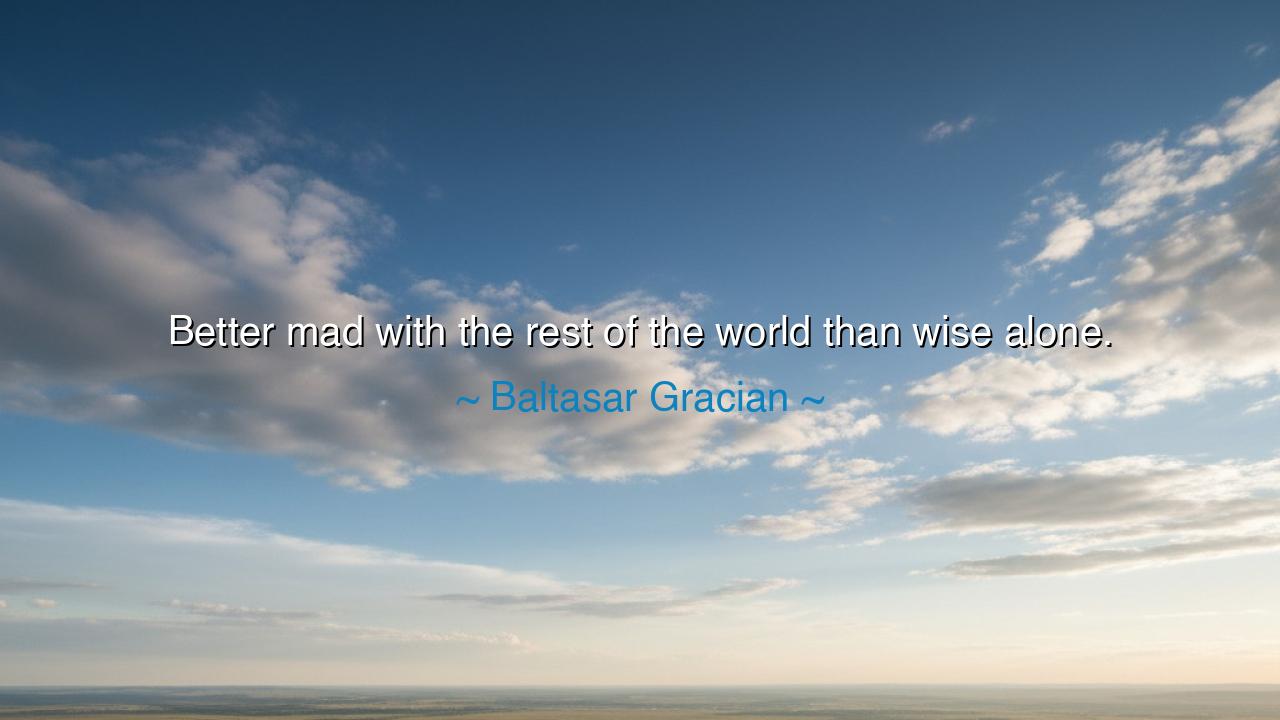
Better mad with the rest of the world than wise alone.






"Better mad with the rest of the world than wise alone." — these words, born from the pen of Baltasar Gracián, the Spanish philosopher and Jesuit of the 17th century, carry the bitter perfume of wisdom tempered by experience. Gracián lived in a world of courts and intrigues, where truth was dangerous and solitude the cost of clarity. In this phrase, he did not praise madness, but rather exposed the tragedy of wisdom in an unwise age. To be wise alone is to see the world’s folly and stand apart from it — but such solitude, though noble, brings exile of the soul. Thus, he whispers: Better to be mad with others than abandoned by all in your sanity.
Imagine, for a moment, the philosopher Socrates, walking through the marketplace of Athens. He sees men hurrying after gold, shouting their certainties into the wind, and building statues to their own vanity. He speaks of virtue, of moderation, of the examined life — and for this, he is condemned. In his final hours, as the hemlock rises through his veins, the crowd rejoices in its victory over reason. Here, the madness of the world triumphs over the wisdom of one man. Was it better, then, to join them in their delusion — to shout nonsense with the mob and live? Or to die in truth, yet alone? Gracián’s words echo here, both as lament and warning.
For madness shared has a strange comfort. When the world burns, there is warmth in the fire of the multitude. To go against the storm of common folly is to be struck by it, to lose one’s shelter among men. History is filled with such souls — Galileo, who dared to say the earth moved when all swore it stood still; Giordano Bruno, who saw the infinite and was consumed by the flames of those who could not bear it. Their wisdom isolated them, their truth made them heretics. Yet the crowd slept peacefully in its collective madness. It is no small thing, then, to choose to be right when rightness costs you everything.
But Gracián was no martyr — he was a survivor. He lived not in the heavens of idealism but in the dense forest of human ambition. His quote speaks not of surrender, but of cunning wisdom — the art of appearing to join the madness while keeping one’s mind intact. To walk among fools yet remain aware of their folly is a higher wisdom still. The one who is mad with the rest may keep his peace, his position, his influence — and sometimes, beneath the veil of madness, he may guide the world toward reason without being destroyed by it.
This is not hypocrisy; it is strategic wisdom — a lesson for all who dwell among the volatile tempers of men. In times when truth brings ruin, silence becomes strength. When the crowd worships the false, the wise must choose their moment to speak or to mask their insight. To be wise alone and aloud is to perish; to be wise quietly among the mad is to endure until the season of reason returns. The ancients knew this: the oak that resists the storm is torn down, but the reed that bends survives.
In our own age, this lesson burns anew. The modern world, too, has its madness — the noise of opinions, the worship of appearance, the rush toward comfort at the expense of truth. Those who see clearly are mocked, those who think deeply are silenced by the din. The path of the wise has not changed; it is still narrow and lonely. Yet Gracián calls us not to despair, but to adapt without surrendering. Be among the world, but not of it. Keep your inner flame alive, even if outwardly you seem to dance with the rest in their folly.
The story of Gracián’s quote is thus both a mirror and a compass. It shows us the cost of wisdom, but also the art of surviving among the unwise. The true sage knows when to speak and when to seem to agree, when to stand apart and when to walk beside the mad for a while. He preserves his light beneath the cloak of night, waiting for dawn. For wisdom that dies alone helps no one; wisdom that endures in secret may yet save the world.
Lesson: To live wisely is not to flee the world’s madness, but to move through it with open eyes and a guarded heart. Do not scorn the multitude, nor give them all your truth at once. Learn the art of patience, of subtlety, of timing. Know when to appear foolish, that your wisdom may survive. In this way, you will be both among men and above them — not as an exile of reason, but as a hidden guardian of it.






AAdministratorAdministrator
Welcome, honored guests. Please leave a comment, we will respond soon